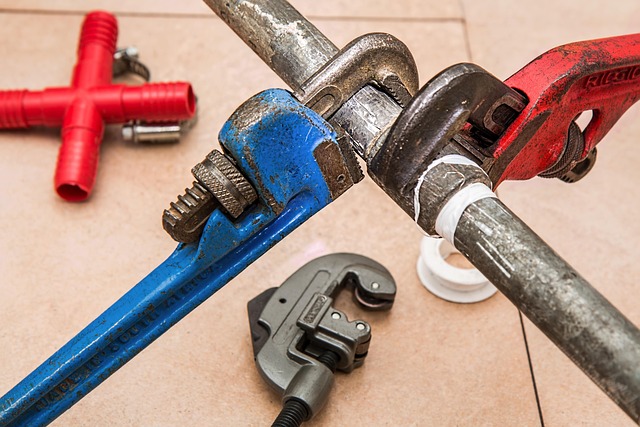Plumbing technologies, including smart water detectors, tankless heaters, advanced water filtration, and trenchless repairs, are revolutionizing global water conservation. These innovations optimize water usage in residential and commercial settings by minimizing waste through precise irrigation, efficient heating, and high-quality purification, while digital controls enable remote monitoring and adjustments for responsible management.
In today’s world, water conservation is more crucial than ever. Smart irrigation systems emerge as a game-changer in this effort, leveraging advanced plumbing technologies to optimize water usage. This article explores innovative solutions like smart water detectors, real-time moisture sensors, tankless heaters, and trenchless repairs. We delve into how these technologies, powered by digital controls, contribute to sustainable practices while ensuring efficient and clean water use. By embracing these innovations, we can navigate towards a more resilient future with reduced water waste.
- The Role of Plumbing Technologies in Water Conservation
- – Exploring advanced plumbing solutions for efficient water usage
- – How smart irrigation systems contribute to sustainable practices
- Smart Water Detectors: Monitoring and Optimizing Water Usage
The Role of Plumbing Technologies in Water Conservation

In today’s world, where water scarcity is a growing concern, plumbing technologies play a crucial role in promoting water conservation. Smart water detectors and tankless heaters are revolutionary innovations that help reduce water wastage significantly. These devices monitor water usage patterns and automatically shut off supplies when not in use, ensuring every drop is utilized efficiently. For instance, smart irrigation systems equipped with digital controls can adjust watering schedules based on real-time weather data and plant needs, minimizing excessive watering.
Additionally, water filtration technologies improve the efficiency of plumbing systems by purifying water sources, reducing the need for frequent replacement or disposal. Trenchless repairs also contribute to conservation by minimizing disruption to underground water courses and reducing the energy required for traditional excavation methods. These advancements in plumbing not only help preserve our precious water resources but also offer long-term sustainability solutions for both residential and commercial properties.
– Exploring advanced plumbing solutions for efficient water usage

In today’s world, where water conservation is a growing concern, exploring advanced plumbing solutions has become paramount for efficient water usage. Smart irrigation systems, integrated with innovative technologies like smart water detectors and digital controls, offer precise water delivery tailored to plant needs. These systems can detect soil moisture levels, ensuring plants receive only the required amount of water, thereby reducing waste. Moreover, tankless heaters and water filtration systems enhance efficiency by minimizing water wastage during heating processes and improving overall water quality.
Trenchless repairs, another significant development in plumbing technologies, provide a non-invasive method for fixing leaks or replacing pipes. This approach conserves water by preventing disruptions to the irrigation system and reducing the need for extensive excavation. Combined with these advancements, digital controls enable users to monitor and adjust watering schedules remotely, fostering further responsibility and efficiency in water management.
– How smart irrigation systems contribute to sustainable practices

Smart irrigation systems play a pivotal role in promoting sustainable practices within the realm of water management. By leveraging advanced plumbing technologies, these innovative solutions optimize water usage and reduce waste. Smart water detectors embedded in the ground monitor soil moisture levels, ensuring plants receive precisely the right amount of water they need. This data-driven approach eliminates overwatering, a common issue with traditional systems, thereby conserving precious resources.
Furthermore, integration of tankless heaters and advanced water filtration systems ensures that the water distributed is clean and efficient. Trenchless repairs, facilitated by digital controls, minimize disruptions to landscapes and reduce the environmental footprint associated with traditional excavation methods. These features collectively contribute to a more sustainable and eco-friendly approach to irrigation, aligning with modern efforts to conserve water and protect the environment.
Smart Water Detectors: Monitoring and Optimizing Water Usage

Smart water detectors are revolutionizing how we manage water conservation in both residential and commercial settings. These innovative plumbing technologies utilize advanced sensors and digital controls to monitor water usage in real-time, allowing for precise optimization. By integrating smart water detectors into existing systems, users can gain valuable insights into their water consumption patterns, identifying areas where waste occurs. This data-driven approach enables homeowners and businesses to make informed decisions about their water usage, potentially reducing costs and environmental impact.
One notable application of smart water detectors is in conjunction with tankless heaters and advanced water filtration systems. These components work harmoniously to ensure efficient water heating and purification, further enhancing water conservation efforts. Additionally, trenchless repairs, a modern plumbing technique, complement these technologies by minimizing excavation and reducing water disruption during maintenance or replacement processes. Together, these innovations create a comprehensive solution for sustainable water management, contributing to a greener future.
